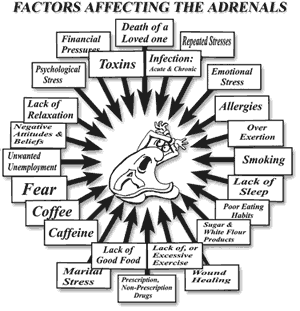Adrenal Fatigue
 The adrenal glands are a major part of the endocrine system. They are small glands that rest above the kidneys. They are responsible for the synthesis and excretion of cortisol. Stress stimulates cortisol in order to send high energy lipids into the blood stream to be used in times where quick bouts of physical exertion needs to take place, such as jumping out of the way of a moving car or fighting off a mountain lion in the wilderness.
The adrenal glands are a major part of the endocrine system. They are small glands that rest above the kidneys. They are responsible for the synthesis and excretion of cortisol. Stress stimulates cortisol in order to send high energy lipids into the blood stream to be used in times where quick bouts of physical exertion needs to take place, such as jumping out of the way of a moving car or fighting off a mountain lion in the wilderness.
People today are experiencing this stress response in a more chronic way. Acute stress is normal and the body tends to readjust and come back into balance. Chronic stress is another way to describe a long term imbalance. Chronic stress can lead to a long list of health problems. Adrenal fatigue is a result of chronic stress.
Adrenal fatigue can result in feelings of exhaustion, sluggishness, headaches, bowel irregularities, inability to focus, food cravings and much more. Adrenal fatigue can also increase risks for hormonal imbalances and certain cancers such as prostate, breast, and cervical cancers. The imbalance of hormone production can also lead to problems with metabolism because it influences the thyroid glad as it is the precursor for thyroid hormones TSH, T3, T4. When certain precursors are not available for other systems and organs in the body, the deficiency can lead to even further imbalances
Stress can come in many forms and typically relates to how the mind is processing life’s circumstances. Eating patterns, toxins, sleep and exercise all contribute to stress management. Skipping meals will actually increase insulin production which stimulates cortisol production. Lack of sleep has a similar effect to skipping meals. Toxins injure and disrupt cell function and hormonal balance. Exercise has an inverse effect by helping to lower insulin and cortisol levels, unless it’s in excess or done irregularly as with the “weekend warriors”.
Eating foods that help support adrenal function typically involves a variety of nutrients but Vitamin B’s in particular. Individuals experiencing a diet low in B vitamins, such as vegetarians, as well as those experiencing chronic stress, may benefit from a daily B-complex vitamin to help replenish the adrenals. Antioxidants are also helpful in minimizing oxidative stress to your tissues and cells. The best way to obtain proper vitamins is through food due to higher bioavailability and synergy in the body. Electrolyte imbalances may also occur as cellular function is disrupted. Imbalances or deficiencies in magnesium, sodium and potassium may arise. Gut health is important for proper absorption of these vital nutrients. If your gut is impaired, it can greatly influence your immune function and ability to recover from stress. Some people need varying dosages and types of vitamins and minerals depending on individuality and stage of adrenal fatigue, so it is important to identify your metabolic state before taking any supplementation.
Stress triggers the nervous system to send signals to the intestinal tract. These signals can cause peristalsis (stops movement). Peristalsis can lead to constipation (backing up) and bowel obstruction. This obstruction can further lead to bacterial imbalances and overgrowth. Food can literally “rot” inside the intestinal tract leading to inflammation, bloating and more oxidative stress. This can result in leaky gut syndrome. Exercise, hydration and foods high in fiber can help relieve this blockage. The mind and body are connected, so the cause of the stress will need to be addressed. The term anal retentive relates to anxiety, being “uptight”, having the need to be in control. Counseling may help someone with chronic bowel obstruction through identifying the stress and finding ways to “let it go” and move on to a life of peace and healing.
Breathing techniques as well as guided imagery have been helpful for many who don’t have money or time for structured counseling with a professional psychiatrist or social worker. Breathing techniques can be done anywhere, even at your desk. Prayer, meditation, yoga and other techniques have been shown to lower stress hormones and bring about feelings of calmness and peace.
How do you know if you have “adrenal fatigue” and what can you do about it? There are many symptoms that relate to sleep, energy level, heart rate, and intestinal health. Testing for adrenal fatigue includes identify cortisol levels as well as review of symptoms. A saliva test which measures repeated levels throughout a day and over a time period is recommended. It is nearly impossible to diagnose adrenal fatigue without taking a good history of your symptoms and following cortisol levels. Adrenal fatigue has different stages. High blood pressure, heart palpitations, feeling “wired and tired” leading to insomnia or difficulty sleeping, high triglycerides and cortisol levels, muscle loss and weight gain, inability to lose weight, feeling light headed, poor focus or “foggy”, and poor gut health. If adrenal fatigue progresses, it can lead to adrenal exhaustion. Once this happens, you may need additional medical attention to help you recover. Adrenal exhaustion shows up as low cortisol levels, low blood pressure, extreme fatigue, weight loss, inability to focus, hypothyroidism and hormonal imbalances. Hormonal imbalances may lead to hair loss, dry skin, and for women especially, loss of the menstrual period, cysts and inability to get pregnant. Prolonged imbalances most times lead to illness and disease.
Adrenal fatigue can be resolved by simply taking steps to decrease stress on the body. Rest is your best option. The next step is to eliminate toxins and nourish the body with the appropriate foods while addressing any gut issues. This may require eliminating existing medications. Exercise is important as well, but many who suffer adrenal fatigue may need to start slowly as to not exhaust the adrenals even further. This is why yoga causes people to feel energized. It’s a more relaxing way to exercise and it helps you focus on your breathing, ultimately putting stressful thoughts out of your mind. With adrenal fatigue, one might ask, “what’s eating at you” because there is something literally eating away at you, breaking down your body and speeding up the aging process.




 Providing nutritional therapy and lifestyle education for disease prevention and weight management....
Providing nutritional therapy and lifestyle education for disease prevention and weight management....